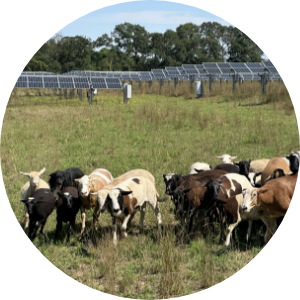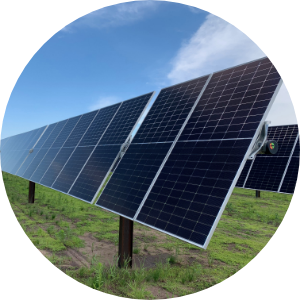Our Climate > Supporting Solar Energy
Supporting Solar Energy in Wisconsin
To fight climate change, Wisconsin must cut carbon and shift to clean energy—solar is key. Clean Wisconsin is accelerating our state’s transition to 100% carbon-free electricity by 2050 with a focus on solar, wind, storage, and energy efficiency. Paired with battery storage, solar delivers reliable, local energy around the clock. It also protects our environment and creates good-paying jobs for Wisconsinites.
Jump to Section
Explore Our Approach
Overview
How Solar Builds a Better Tomorrow
Solar energy is one of the fastest-growing and most affordable ways to power Wisconsin. Instead of importing fossil fuels, we can generate clean electricity right here at home—supporting local jobs, reducing pollution, and strengthening our energy independence. Large-scale solar farms, especially when paired with battery storage, offer a reliable, low-cost solution to meet the state’s energy needs around the clock. By investing in solar, Wisconsin can protect public health, grow the economy, and create a brighter future for generations to come.
$14 billion
spent each year importing coal and gas
162,000
clean energy jobs could be created in Wisconsin
$2-4 billion
in potential health care savings from reduced pollution
100x
more efficient than corn ethanol
80
Wisconsin homes powered by 1 acre of solar
KEY INITIATIVES
Why Solar Matters for Wisconsin
Solar energy is more than just clean electricity—it’s an opportunity to revitalize Wisconsin’s economy, strengthen communities, and protect our land, water, and health. From stable income for family farmers to payments for local governments, solar delivers wide-reaching benefits across the state.

Solar Farms Help Power Progress
To reach net-zero by 2050, Wisconsin needs to build 1,000+ MW of solar each year. That means solar farms bringing more community investment, financial stability for family farms, and affordable energy.

Local Revenue from Solar Projects
Large solar farms do more than generate clean power—they also generate revenue. Under Wisconsin law, local governments hosting solar projects over 50 megawatts receive $5,000 per megawatt each year. That can mean millions of dollars each year for roads, public buildings, emergency services, and other critical local needs.

Reliable Income for Family Farms
Solar leases offer farmers reliable, drought-resistant income year after year. This stable revenue helps buffer against fluctuating crop prices, trade disruptions, and climate-driven weather extremes—giving family farms a better chance to stay on the land for generations.

Restoring Land and Ecosystems
Solar farms restore soil health, reduce water pollution, and support wildlife. Deep-rooted vegetation can increase soil carbon by 65% and improve habitat for pollinators by 300%.
Solar also delivers 100x more energy per acre than corn ethanol. Wisconsin could meet its solar goals using just 15% of the land currently used to grow corn for ethanol.

Solar Improves Public Health
Replacing coal and gas with solar cuts harmful air pollution—and that saves lives. Every kilowatt-hour of solar avoids 5–10 cents in public health costs, exceeding the cost of generating the energy itself. Clean power means fewer hospital visits, healthier communities, and long-term savings for everyone.
STAY INFORMED
Join the Fight for Our Climate
Sign Up For Email Updates
"*" indicates required fields